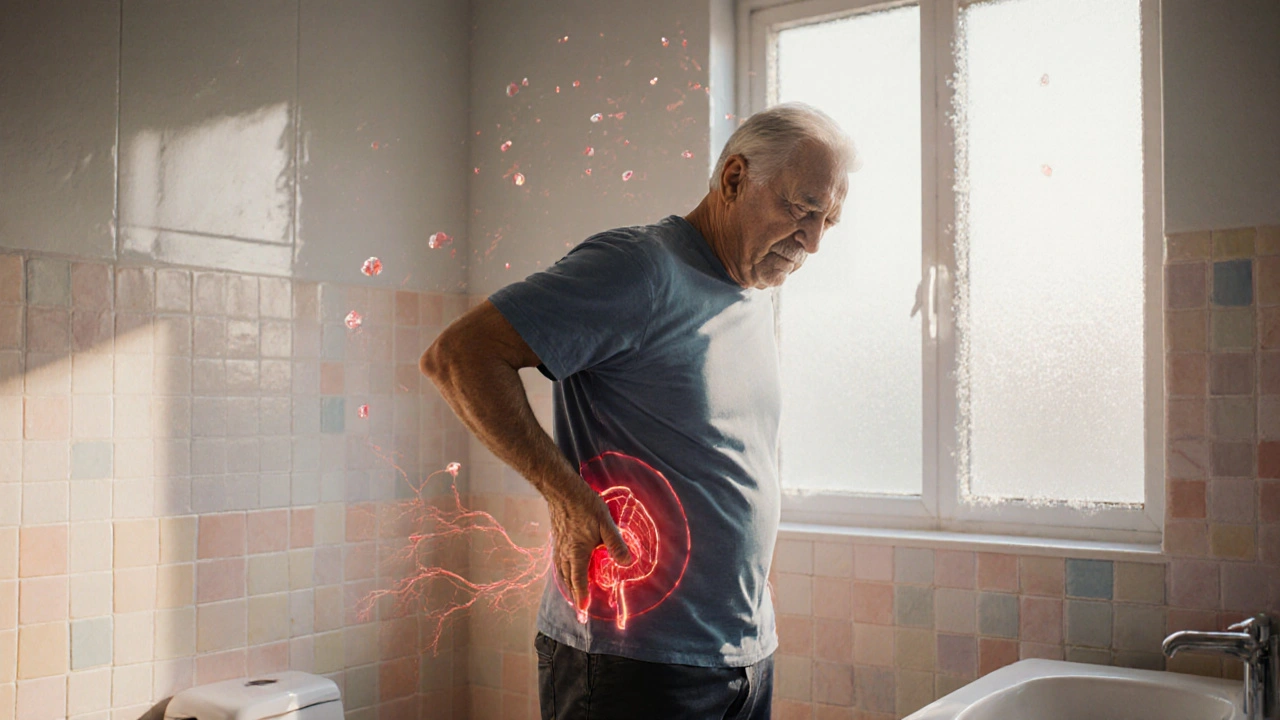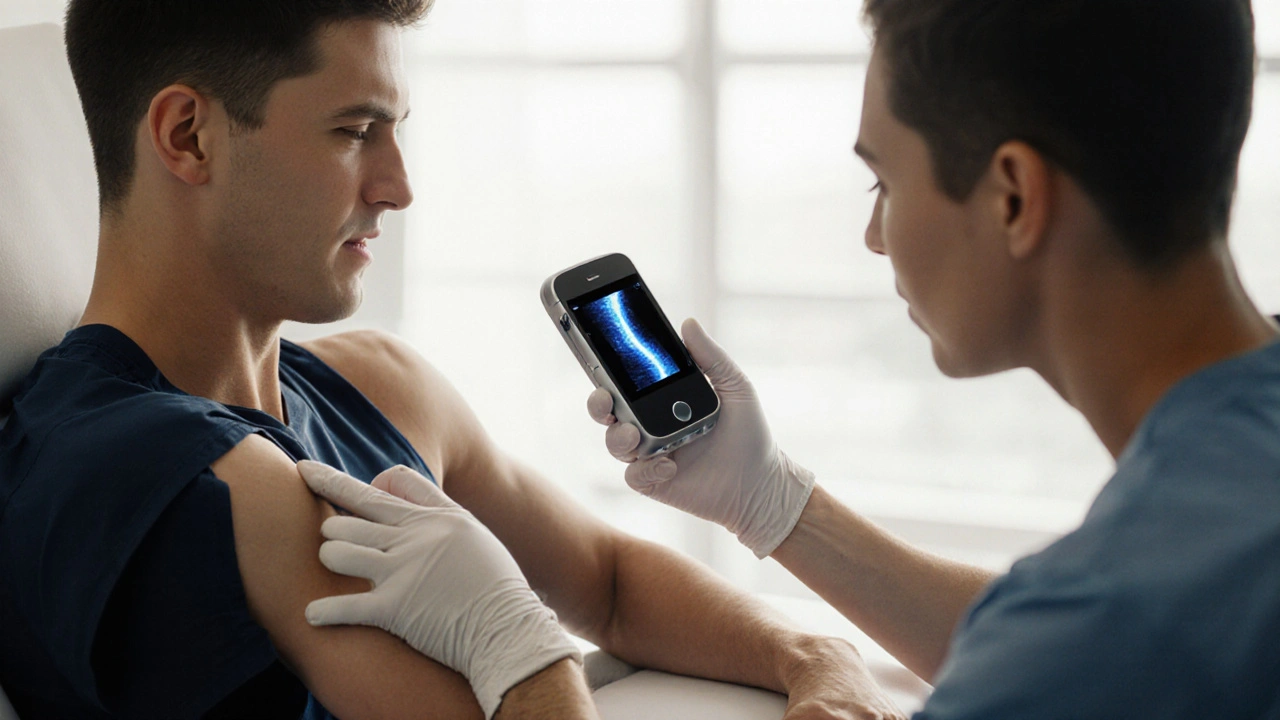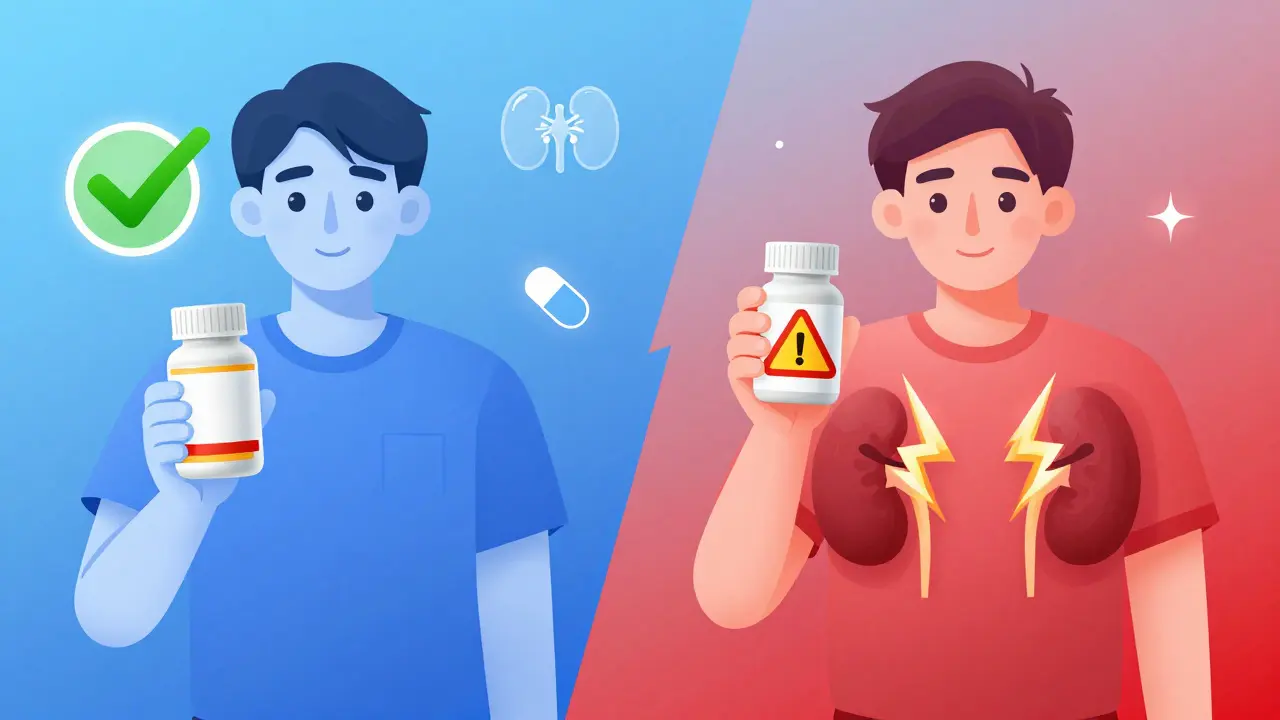
Diabetes Urinary Symptoms Checker
Your Symptoms
Medical History
Potential Causes Identified
If you’ve ever wondered how diabetes affects your bathroom habits, you’re not alone. Many people with the condition notice changes in how often they go, the urgency they feel, or even trouble emptying the bladder altogether. This article breaks down why high blood sugar can turn a simple trip to the toilet into a frustrating ordeal, and what you can actually do about it.
TL;DR
- High blood sugar can damage nerves that control the bladder (diabetic neuropathy).
- Kidney damage alters fluid balance, increasing urine volume.
- Some diabetes medicines and other drugs can tighten the bladder neck.
- Infections and prostate issues can compound the problem.
- Early detection and lifestyle tweaks can restore normal urination.
How High Blood Sugar Hits the Urinary System
When blood glucose climbs, the kidneys work overtime to flush the excess sugar out. This process, called osmotic diuresis, forces you to urinate more often. Over time, the extra workload can strain the delicate filtering units in the kidneys, leading to diabetic nephropathya type of kidney disease caused by prolonged high blood sugar. The damaged kidneys struggle to regulate fluid, which can cause both over‑production of urine and, paradoxically, retention when the bladder muscles don’t respond properly.
When Nerves Lose Their Signal - Diabetic Neuropathy and Bladder Control
One of the most common culprits behind difficulty urinating in people with diabetes is diabetic neuropathynerve damage resulting from chronic high blood glucose. The nerves that tell your bladder when it’s full, or how strongly to contract, can become dulled. This condition is called bladder dysfunctionimpaired ability of the bladder to store or expel urine efficiently. Symptoms range from a weak stream and dribbling to a complete inability to start urination - medically known as urinary retentionthe inability to fully empty the bladder.
Kidney Damage, Fluid Balance, and the Urge to Pee
When diabetic nephropathy progresses, the nephrons (filtering units) lose efficiency. The body compensates by increasing blood flow and, consequently, the volume of urine produced. This can make you feel the need to urinate more frequently, especially at night. The extra volume also means the bladder fills faster, giving less time for the nervous system to coordinate a smooth emptying. If the bladder muscles are already weakened from neuropathy, the combination can feel like a double‑whammy.
Medications That Can Tighten the Bladder Neck
Not every urinary problem comes directly from sugar levels. Some drugs prescribed for diabetes or its complications have side effects that affect the urinary tract. For instance, certain diuretic medicationsdrugs that increase urine production to lower blood pressure or reduce fluid buildup can cause rapid bladder filling and urgency. Others, like alpha‑blocker antagonists used for blood pressure, may relax the muscle at the bladder neck, leading to incomplete emptying. Always double‑check medication leaflets for terms like “urinary retention” or “frequency”.

Infections and Prostate Issues - Adding Fuel to the Fire
People with diabetes are more prone to urinary tract infections (UTIs)bacterial infections in any part of the urinary system because high sugar provides a perfect breeding ground for bacteria. A UTI can inflame the bladder lining, making it painful and hard to empty. In men, an enlarged prostate-known as benign prostatic hyperplasia (BPH)non‑cancerous growth of the prostate gland that can obstruct urine flow-often co‑exists with diabetes, further complicating the picture.
Quick Comparison of Common Causes
| Cause | Mechanism | Typical Symptoms | First‑line Treatment |
|---|---|---|---|
| Diabetic Neuropathy | Nerve damage to bladder control pathways | Weak stream, incomplete emptying, dribbling | Bladder training, scheduled voiding, meds like mirabegron |
| Diabetic Nephropathy | Reduced kidney filtering leads to fluid overload | Frequent night urination, increased volume | Blood‑sugar control, ACE inhibitors, fluid management |
| UTI | Bacterial infection irritates bladder | Burning, urgency, cloudy urine | Antibiotics, increased water intake |
| BPH (men) | Prostate enlargement blocks flow | Hard start, weak stream, nocturia | Alpha‑blockers, lifestyle tweaks |
| Medications (diuretics) | Increased urine production | Urgency, frequent trips | Adjust dose, timing, or switch drugs |
When to Call a Healthcare Professional
Not every change warrants an emergency visit, but there are red flags that mean you should book an appointment ASAP:
- Inability to pass any urine for more than a few hours.
- Severe pain or burning during urination.
- Fever or chills alongside urinary symptoms.
- Blood in the urine.
- Sudden swelling of the lower abdomen indicating a full bladder.
If you notice any of these, head to urgent care. Otherwise, schedule a routine review with your GP or endocrinologist to discuss persistent issues.
Managing Difficulty Urinating - Practical Steps
Here’s a straightforward action plan you can start today:
- Track your bathroom trips for a week - note time, volume, and any strain.
- Keep blood‑glucose numbers in target range; even modest improvements can ease nerve stress.
- Stay hydrated but avoid excessive fluids right before bedtime.
- Practice double‑voiding: go, wait a minute, then try again to empty the bladder fully.
- Incorporate pelvic floor exercises (Kegels) to strengthen bladder muscles.
- Review meds with your doctor; ask if any can be switched or timed differently.
- Schedule a yearly urine test to catch infections early.
These steps won’t cure underlying nerve damage overnight, but they can dramatically reduce the daily frustration of a leaky or blocked bladder.
Bottom Line
Diabetes and difficulty urinating are linked by a web of factors - from nerve damage and kidney strain to infections and medication side effects. Understanding the specific cause in your case is the first step toward relief. Tight blood‑sugar control, regular medical check‑ups, and a few lifestyle tweaks can turn the tide and make bathroom trips feel normal again.
Frequently Asked Questions
Why does high blood sugar make me urinate more?
When glucose levels rise, the kidneys filter the excess sugar into the urine, pulling water along with it. This osmotic effect increases urine volume and the need to pee.
Can diabetes cause a completely blocked bladder?
Severe diabetic neuropathy can weaken the bladder’s contraction so much that urine backs up, leading to retention. It’s rare but possible and needs medical attention.
Do I need a specialist for urinary problems?
Start with your primary doctor or endocrinologist. If they suspect nerve or prostate issues, they’ll refer you to a urologist for further testing.
How can I tell if a UTI is the cause?
Look for burning, cloudy or foul‑smelling urine, and possibly fever. A simple urine dip test at the clinic confirms infection.
Are pelvic floor exercises safe for men with diabetes?
Yes. Kegel exercises strengthen the muscles that help start and finish urination and are recommended for both men and women dealing with bladder dysfunction.






Xavier Hernandez
September 30, 2025 AT 16:23Man, the way diabetes sneaks into your bathroom routine is downright obscene. It's like a stealthy thief stealing your peace of mind while you sit on the porcelain throne. If you haven't tightened that blood‑sugar ship yet, you're basically inviting a chaotic carnival of urgency and dribbling. Take charge now before your bladder writes a tragic novel.
Zach Yeager
October 10, 2025 AT 19:23America should stand up and address this health crisis now
Phoebe Chico
October 20, 2025 AT 22:23Ever pondered the metaphysical dance between glucose and the humble bladder? It’s as if your kidneys are throwing a perpetual rave, and your bladder is the exhausted bouncer. The neuropathy whispers sweet nothings, telling the muscles to relax when they should contract. Meanwhile, the lingering threat of infection lurks like a shadowy philosopher. Bottom line: your body’s narrative is a paradoxical saga of control and chaos.
Michael Stevens
October 31, 2025 AT 00:23Hey folks, totally get how frustrating this can be. I’ve seen friends wrestle with the same night‑time trips and weak streams. Small tweaks like double‑voiding and staying hydrated can make a real difference.
Ann Campanella
November 10, 2025 AT 03:23Honestly, most of this is just overblown hype. If you’re not tracking your sugars, you’re doing it wrong.
Desiree Tan
November 20, 2025 AT 06:23Respect the struggle, but a solid bladder training plan can be a game‑changer. Start a timed schedule – every two hours even if you don’t feel the urge. Pair that with pelvic floor exercises and you’ll see steady improvement.
Andrea Dunn
November 30, 2025 AT 09:23People don’t tell you that big pharma is secretly packaging these symptoms to keep us dependent 😂
Erin Johnson
December 10, 2025 AT 12:23Oh, look at you, thinking a few Kegels will solve everything. Spoiler: they’re just a drop in the ocean of diabetic complications. Sure, they’re harmless, but your bladder’s not a magic wand – you need proper glycemic control first. And let’s not forget the importance of ruling out infections before you start blaming neuropathy. In short, don’t oversimplify; it’s a multi‑layered beast.
Rica J
December 20, 2025 AT 15:23Just a note – it’s “diabetic neuropathy”, not “diabetic neuropathey”. Also, “urination” with a ‘z’ is a UK thing.
Linda Stephenson
December 30, 2025 AT 18:23Adding to that, staying mindful of fluid intake after dinner can curb nocturia. Also, a quick check of your meds for any anticholinergic side‑effects is worth the time.
Sunthar Sinnathamby
January 9, 2026 AT 21:23Yo, the bladder schedule hack works like a charm – give it a go and feel the boost!
Catherine Mihaljevic
January 20, 2026 AT 00:23Everyone’s quoting studies but ignoring the hidden agenda behind pharmaceutical trials.
Michael AM
January 30, 2026 AT 03:23Let’s keep it civil, folks. Everyone’s trying to help.
Rakesh Manchanda
February 9, 2026 AT 06:23From an epistemological standpoint, the insinuation that a single pathogen drives these dysuric episodes is a reductionist fallacy. One must consider the gestalt of endocrine dysregulation, psychosocial stressors, and iatrogenic contributions. While amusing to speculate about shadowy cabals, rigorous analysis demands a multidimensional approach. Hence, I encourage a balanced appraisal of peer‑reviewed literature rather than sensational conjecture.
Erwin-Johannes Huber
February 19, 2026 AT 09:23Well said, and remember to stay hopeful.